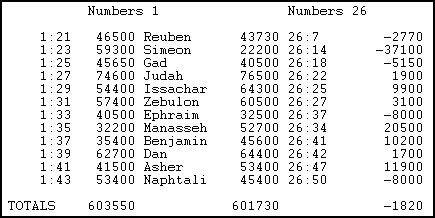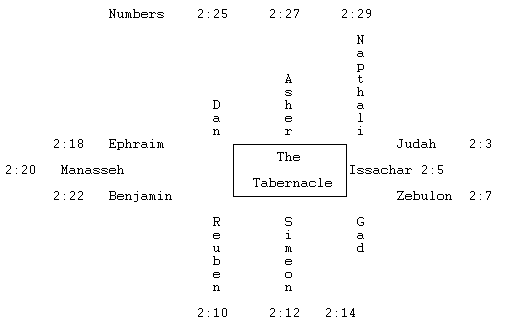|
April
8
|
Reading 1 - Numbers 26
Peter Cresswell
Peter Cresswell
v. 2 - 64 This detailed numbering was to establish one point - that God keeps his word. None of those who had rebelled at the tie of the first arrival at the land were still alive. It is interesting that Yahweh used the inclination of the people with respect to the Moabitish women to bring about His will. The differences in the two numberings in Numbers and the positions of the tribes around the Tabernacle:


Peter Forbes
Peter Forbes
Reading 2 - Proverbs 18
Peter Cresswell
Peter Cresswell
Peter Forbes
Peter Forbes
Peter Forbes
Reading 3 - Philippians 1 & 2
Peter Cresswell
1 v. 1 In almost all of his letters Paul introduces himself as an 'apostle of Jesus Christ'. These are the only three epistles of Paul in which he does not introduce himself as an apostle of Jesus Christ. Philippians 1Thessalonians 2Thessalonians Philemon The question of his apostleship was a major issue in the first century. The absence in Philippians might indicate his authority was not in question there. However with respect to Thessalonica it is a little puzzling as he warned them about letters which purported to come from him. Maybe, despite the warning, he knew that his authority was not in question. maybe the letters purporting to come from Paul were sent to Thessalonica as the writer of the fraudulent letters knew that that the Thessalonians would not question anything which came from Paul.
2
v.3 'strife
and vain glory' highlights the major theme of the epistle to the Philippians.
There was strife amongst some, at least of them. Look for references to
unity throughout the whole of the letter to help you to appreciate the
reason for the letter.
Peter Forbes
1:6-8
He feels strongly for them. So strongly, in fact, that he is concerned
for their eternal well being. This raises the question as to whether we
love our brethren and sisters to such an extent. Our fellowship with our
brethren and sisters is more than mere friendship. Our love for them should
be such that we pray for their spiritual health and their eternal wellbeing.
Peter Forbes
1:6 How often do we begin something never to finish it? Starting is easy. It is the continuing that is the hard part!
2:19 In saying that he 'trusted in the Lord' Paul is identifying himself with Hezekiah (2 Kings 18:5) - notice the other quotations of language from the time of Hezekiah.
|
Highly
exalted
|
Isaiah
52:13
|
|
|
every
knee bow …
|
Isaiah
45:23
|
|
|
sick
unto death
|
2 Kings 20:1
|
One of Paul's aims was to advance the gospel. As he traveled from place to place he taught as many people as he could the good news of Christ and the kingdom of God. Paul also encouraged others to join in with his preaching. People like Timothy, Mark, Barnabus, Silas, Titus and Luke all traveled around with Paul and helped him spread the gospel. There were also people in the places Paul visited who continued the work that he had started in their city. It is, after all, what we call the "Great Commission" to "go into all the world and preach the gospel to all creation." What Paul ended up doing was to establish a huge spreading gospel net where the people convinced of the gospel would reach out and share it with others, who in turn do the same. We need to become part of that net to spread the word of God.
If we told two people the gospel message today, and tomorrow they told two people each, and each of them told two, within 10 days 1023 people will have heard the gospel message. We need people to preach and reach people for Christ. Paul says, "The important thing is that in every way ... Christ is preached. And because of this I rejoice."
Let's go to it. Go, Tell the world!
Robert Prins
One of the strong themes that comes out from this letter to the Philippians is that of unity. Reading between the lines we can see that the Philippians were a bit like us. There were personality clashes, selfishness and pride which caused little divisions within the church and prevented them working together as a team in unity as Christ intended. So Paul gave them some gentle pointers as to how to get on with each other, starting first with a plea from his heart to their (and our) conscience. "If you love Christ then give me joy by being united," is essentially what he says. Do we love Christ? Are we united with our brothers and sisters?
If we want to be united, which of course we do, then we must get our priorities right and concentrate on what is really important: being like-minded, having the same love, being one in spirit and purpose. We must be selfless - not selfish, serving one another in humility and in love and taking care of each other. We need to stop complaining and grumbling because in doing that we spread discord and dissatisfaction.
Are there divisions where you are? Even small ones? It's up to us to do our part to get on with each other. "Blessed are the peacemakers for they will be called the Sons of God."
Robert Prins